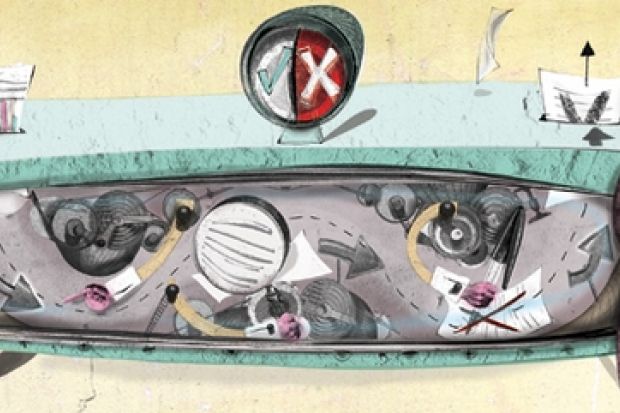Discussions of the peer review system generally agree that it is imperfect, even significantly flawed, but that there are no viable alternatives. Recently, the debate has shifted to the "racket" that is academic publishing: how commercial publishers are getting fat on the unpaid labour of researchers only to sell, at exorbitant cost, the product back to the author - not to mention reserving all copyright. Many hope that the internet might save the day by providing avenues for open-access publishing.
But this won't happen any time soon. Peer-reviewed articles in an ever-decreasing list of "top ranked journals" are the only respected channels of scholarly output in our community. Scholars, especially scholars early in their careers, are under enormous pressure to "prove" their credibility through traditional peer-reviewed publishing. Given that peer review is evaluation by experts and not just peers, most early-career researchers engage in the process in the belief that it will be genuinely developmental.
This is often the case. I have published in a variety of social sciences journals, I sit on the editorial board of two and I peer review for a host of others. I have received referee reports of varied levels of engagement, rigour and quality. These discrepancies are echoed in the reports I myself provide, increasingly dependent on pressures of time. The current academic culture, with its injunction to publish more and to publish faster, threatens the sustainability of the kind of reciprocity that underlies peer review.
But the threat to peer review also comes from within. We all know that the refereeing process is not scientific. It is arbitrary, often a matter of luck or politics (or both). The current competitiveness of the academic market, courtesy of the research excellence framework, also makes referees more cavalier. They are increasingly engaged in a process that has casually come to be known as "citation dictation", or dictating the terms of acceptance on the basis of inclusion of references to their own (not-so-anonymous) work. While I know of researchers who have pulled back papers on this account, a majority - especially more junior academics - will not feel able to do so. They will end up reformulating, sometimes substantially, their work to reflect a misguided idea of peer review, born of personal ego but normalised by the marketisation of research. One might argue that the system of anonymous double peer review, together with editorial input, was put in place precisely to counter such discrepancies. But editorial input varies; it is often minimal or absolute. Letters to journal editors are written not in the spirit of questioning their judgement but of demonstrating obedience.
The REF regime also means that journals are witnessing unprecedented levels of submissions. The sheer volume of submissions means that rejection rates have, in turn, shot up. Best practice is upheld by those journals that pass on referee reports even for articles that are rejected. Worst practice, as I have learned from my own experience and that of others, is to reject without forwarding any referee reports or editorial comments in the belief that a disclaimer of the kind "X regrets that it cannot relay referee reports for articles that it does not accept for publication" will suffice. This seems to take two forms. One is when the editor decides not to send the article for refereeing at all and it is rejected at that stage without referee reports.
The other is when the journal goes through the trouble of obtaining referee reports to tell you that the article has been rejected. How is the withholding of referee reports in this instance not a basic violation of the right for access to information as enshrined in the Freedom of Information Act 2000? Without even venturing into legalities, such a practice clearly relinquishes all standards of accountability. The journals in question are simply accountable to no one. This lack of transparency in the peer-review process just facilitates the kind of biases and exclusions that we are familiar with, not to mention the possibility of plagiarism. For early-career researchers who are going through the trials of the job market, to receive a blanket rejection from a journal after waiting six to eight months can have a devastating effect. One is shut out from all possible avenues for evaluation.
An academic culture of reciprocity is already under threat by the privatisation of our universities. While responsibility might be laid outside, much can be done from within to prevent its complete erosion. Journal editors could do a more thorough job of screening or reviewing referee reports to ensure standards and weed out politics. They could institute best practice by enshrining the right to referee reports as a basic right to information. Peer reviewers could hold editors accountable for their decisions and the manner in which referee reports are communicated - or not - to authors. Doctoral students and early-career researchers can be mentored for participating in a system not of patronage, dependence and obedience but of equality and exchange. Peer review is done in our name (no matter who profits); its flaws and imperfections reflect us, as individuals and as a community of peers.
Register to continue
Why register?
- Registration is free and only takes a moment
- Once registered, you can read 3 articles a month
- Sign up for our newsletter
Subscribe
Or subscribe for unlimited access to:
- Unlimited access to news, views, insights & reviews
- Digital editions
- Digital access to THE’s university and college rankings analysis
Already registered or a current subscriber? Login
